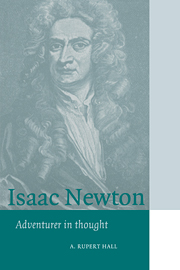Book contents
- Frontmatter
- Contents
- List of Figures
- General Editor's Preface
- Foreword
- Acknowledgement
- 1 The Hopeful Youth, 1642–1664
- 2 “The prime of my age for invention”, 1664–1667
- 3 Widening Horizons, 1667–1669
- 4 The Professor of Mathematics, 1669–1673
- 5 Publication and Polemic, 1672–1678
- 6 Life in Cambridge, 1675–1685
- 7 The Chemical Philosopher, 1669–1695
- 8 The Mathematical Principles of Natural Philosophy, 1679–1687
- 9 Private and Public life, 1685–1696
- 10 Fluxions and Fury, 1677–1712
- 11 Opticks, or a Treatise of Light, 1687–1704
- 12 Life in London, 1696–1718
- 13 A Man of Authority and Learning, 1692–1727
- 14 Later Books, 1706–1726
- 15 Kensington, 1725–1727
- Appendices
- Notes
- Bibliography
- Index
15 - Kensington, 1725–1727
Published online by Cambridge University Press: 12 January 2010
- Frontmatter
- Contents
- List of Figures
- General Editor's Preface
- Foreword
- Acknowledgement
- 1 The Hopeful Youth, 1642–1664
- 2 “The prime of my age for invention”, 1664–1667
- 3 Widening Horizons, 1667–1669
- 4 The Professor of Mathematics, 1669–1673
- 5 Publication and Polemic, 1672–1678
- 6 Life in Cambridge, 1675–1685
- 7 The Chemical Philosopher, 1669–1695
- 8 The Mathematical Principles of Natural Philosophy, 1679–1687
- 9 Private and Public life, 1685–1696
- 10 Fluxions and Fury, 1677–1712
- 11 Opticks, or a Treatise of Light, 1687–1704
- 12 Life in London, 1696–1718
- 13 A Man of Authority and Learning, 1692–1727
- 14 Later Books, 1706–1726
- 15 Kensington, 1725–1727
- Appendices
- Notes
- Bibliography
- Index
Summary
When his work ceased, the story of Newton's life ended. William Stukeley and John Conduitt – the latter in a memoir sent to Fontenelle, then writing his éloge of Newton as a membre étranger of the Académie Royale des Sciences – agree that his decay began with ‘a relaxation of the sphincter of the bladder; so that he was oblig'd to make water frequently’. Newton curtailed his social life and dined simply: ‘chiefly upon broth, vegetables, and fruit, of which he ate very heartily’. This was about 1722. In August 1724 he passed a bladder-stone, without much pain, and in the following winter suffered bronchitis (or worse). Temporarily, he was much improved in general health by moving out to the village of Kensington, in country air, though he suffered an attack of gout. Through two good years he worked on the third Principia with Pemberton. It was on 7 March 1725 that he had a ‘curious conversation’ with Conduitt about his notion of a secular revolution in the cosmos, whereby matter from the Sun was condensed into bodies, becoming planets, then comets which ultimately fall into the Sun, and so falling may destroy the Earth by fuelling the Sun to excessive heat. Man's duration on Earth Newton took to be brief: for all arts and sciences had been discovered ‘within the memory of history, which could not have happened, if the world had been eternal; and … there were visible marks of ruin upon it which could not be effected by a flood alone.’
- Type
- Chapter
- Information
- Isaac NewtonAdventurer in Thought, pp. 368 - 380Publisher: Cambridge University PressPrint publication year: 1996

